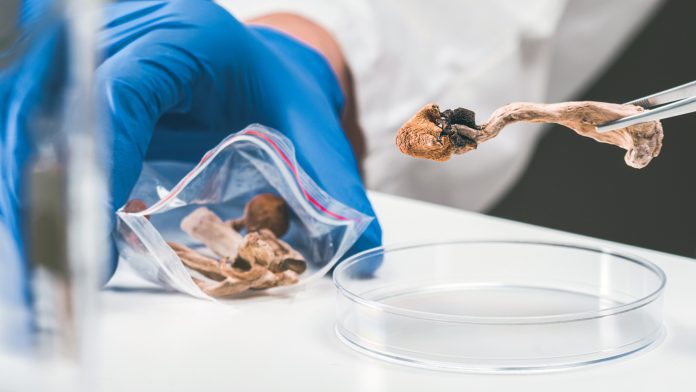
A large clinical trial has found that a single 25mg dose of COMP360 psilocybin had a significant impact on depression symptoms in participants with treatment-resistant depression.
A multicentre clinical trial led by COMPASS Pathways across 22 international sites including the Institute of Psychiatry, Psychology & Neuroscience (IoPPN) at King’s College London and South London and Maudsley NHS Foundation Trust conducted the largest clinical trial to date about the effects of COMP360 psilocybin on treatment-resistant depression.
Around 100 million people in the world suffer from treatment-resistant depression, meaning they have not responded to at least two antidepressant treatments for their major depressive disorder.
The study is published in the New England Journal of Medicine.
Investigating the effects of COMP360 psilocybin
The collaborative team of researchers explored the change in severity of depression, which was assessed using the Montgomery-Åsberg Depression Rating Scale, in participants with treatment-resistant depression over 12 weeks following a single dose of COMP360 psilocybin and psychological support.
The phase 2b clinical trial was conducted at 22 sites in ten countries in Europe and North America between March 2019 and September 2021. A total of 233 participants with treatment-resistant depression were allocated at random to receive a single 25mg, 10mg or 1mg dose of COMP360 psilocybin and psychological support. Those receiving the 1mg dose acted as a control group. The trial was double-blind.
Dr James Rucker, Consultant Psychiatrist & Lead for the Psychoactive Trials Group at IoPPN, at King’s College London and South London and Maudsley NHS Foundation Trust, who took part in the research said: “Whilst many patients with mental health problems get better with available treatments, a subgroup of patients do not even though they try many different forms of treatment. This is sometimes called ‘treatment resistance’. This can lead to a variety of other problems that seriously impact patients and the people around them. Treatment options are often limited, coming with troublesome side effects and/or stigma. Therefore, new paradigms of treatment are needed, and clinical research of new treatments is important. Psilocybin therapy may be a new paradigm of treatment, but this needs to be tested in clinical trials. We are doing this work at the Psychoactive Trials Group, and we deliver new and pioneering treatments in collaboration with our colleagues at the Maudsley Centre for Advanced Treatments.”
“This study, which is by far the largest clinical trial on the use of psilocybin for treatment-resistant depression to date, demonstrated that a single 25 mg dose of psilocybin improved participants’ symptoms of depression in comparison to a 1 mg dose (control). These findings are a positive step in the right direction. Our task now is to investigate psilocybin for treatment-resistant depression in larger clinical trials with more participants, comparing it both to placebo and established treatments.”
The treatment significantly reduced symptoms of depression
The participants were assessed on depression severity before COMP360 psilocybin administration, and follow-up assessments were conducted on day two, and weeks one, three, six, nine, and 12.
They were given COMP360 psilocybin in specialised rooms designed to provide a nonclinical and calming atmosphere. The psychedelic effects lasted between six and eight hours, and an experienced therapist offered support. All the therapists partook in a detailed training programme designed for the trial.
The researchers found that participants who received the 25mg dose of COMP360 psilocybin, with psychological support, experienced a rapid and greater reduction in depression scores than those who received the 1mg control dose.
Over the 12-week study period, adverse effects were witnessed. This included headache, nausea, dizziness and fatigue, which occurred in 84% of participants in the 25mg dose group, 75% in the 10mg dose group, and 72% in the 1mg dose group. Suicidal thoughts and intention of self-injury were seen in all the groups. Most cases occurred over a week after the initial dose.

























